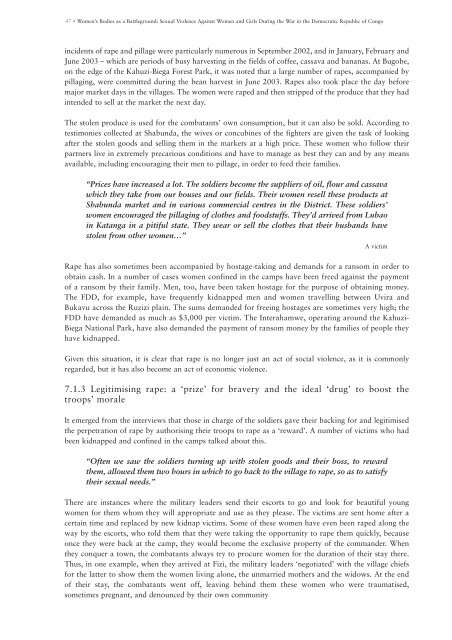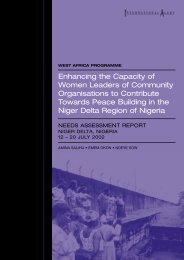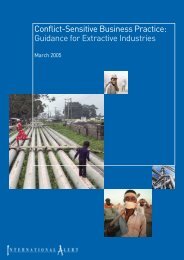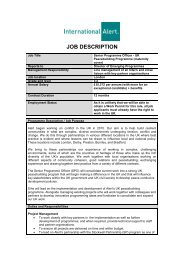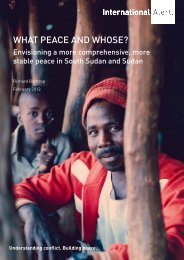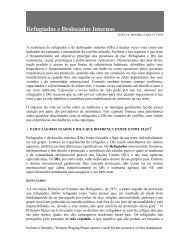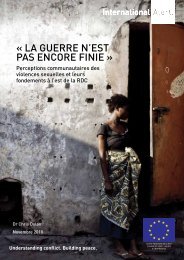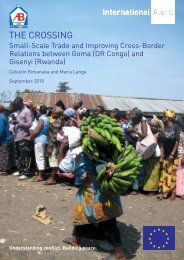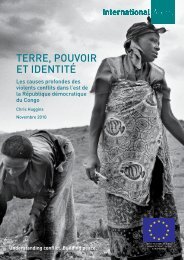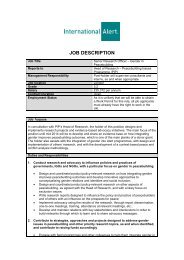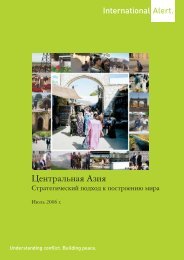Full report - International Alert
Full report - International Alert
Full report - International Alert
- No tags were found...
You also want an ePaper? Increase the reach of your titles
YUMPU automatically turns print PDFs into web optimized ePapers that Google loves.
47 • Women’s Bodies as a Battleground: Sexual Violence Against Women and Girls During the War in the Democratic Republic of Congoincidents of rape and pillage were particularly numerous in September 2002, and in January, February andJune 2003 – which are periods of busy harvesting in the fields of coffee, cassava and bananas. At Bugobe,on the edge of the Kahuzi-Biega Forest Park, it was noted that a large number of rapes, accompanied bypillaging, were committed during the bean harvest in June 2003. Rapes also took place the day beforemajor market days in the villages. The women were raped and then stripped of the produce that they hadintended to sell at the market the next day.The stolen produce is used for the combatants’ own consumption, but it can also be sold. According totestimonies collected at Shabunda, the wives or concubines of the fighters are given the task of lookingafter the stolen goods and selling them in the markets at a high price. These women who follow theirpartners live in extremely precarious conditions and have to manage as best they can and by any meansavailable, including encouraging their men to pillage, in order to feed their families.“Prices have increased a lot. The soldiers become the suppliers of oil, flour and cassavawhich they take from our houses and our fields. Their women resell these products atShabunda market and in various commercial centres in the District. These soldiers’women encouraged the pillaging of clothes and foodstuffs. They’d arrived from Lubaoin Katanga in a pitiful state. They wear or sell the clothes that their husbands havestolen from other women…”A victimRape has also sometimes been accompanied by hostage-taking and demands for a ransom in order toobtain cash. In a number of cases women confined in the camps have been freed against the paymentof a ransom by their family. Men, too, have been taken hostage for the purpose of obtaining money.The FDD, for example, have frequently kidnapped men and women travelling between Uvira andBukavu across the Ruzizi plain. The sums demanded for freeing hostages are sometimes very high; theFDD have demanded as much as $3,000 per victim. The Interahamwe, operating around the Kahuzi-Biega National Park, have also demanded the payment of ransom money by the families of people theyhave kidnapped.Given this situation, it is clear that rape is no longer just an act of social violence, as it is commonlyregarded, but it has also become an act of economic violence.7.1.3 Legitimising rape: a ‘prize’ for bravery and the ideal ‘drug’ to boost thetroops’ moraleIt emerged from the interviews that those in charge of the soldiers gave their backing for and legitimisedthe perpetration of rape by authorising their troops to rape as a ‘reward’. A number of victims who hadbeen kidnapped and confined in the camps talked about this.“Often we saw the soldiers turning up with stolen goods and their boss, to rewardthem, allowed them two hours in which to go back to the village to rape, so as to satisfytheir sexual needs.”There are instances where the military leaders send their escorts to go and look for beautiful youngwomen for them whom they will appropriate and use as they please. The victims are sent home after acertain time and replaced by new kidnap victims. Some of these women have even been raped along theway by the escorts, who told them that they were taking the opportunity to rape them quickly, becauseonce they were back at the camp, they would become the exclusive property of the commander. Whenthey conquer a town, the combatants always try to procure women for the duration of their stay there.Thus, in one example, when they arrived at Fizi, the military leaders ‘negotiated’ with the village chiefsfor the latter to show them the women living alone, the unmarried mothers and the widows. At the endof their stay, the combatants went off, leaving behind them these women who were traumatised,sometimes pregnant, and denounced by their own community


